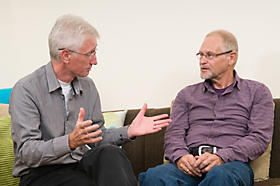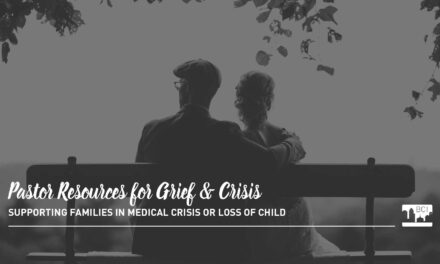3 questions to help you be honest with yourself and others.
The reality of sexual sin can exist within the church just as easily as it can outside it. Protecting yourself — and your family — goes deeper than accountability. What does it mean to be transparent with your struggles?

But “Sunday best” transcended the mere dress code. People wore their Sunday-best faces too. Despite struggles, fears, or insecurities, most people in the church I grew up in were “fine.” We didn’t talk much about failure or sin or mistakes. We dressed in our Sunday best and pretended like we didn’t have any issues.
Growing up in the church, there was only one unpardonable sin. The Bible says it’s blasphemy, but in our church it was adultery. Because we didn’t talk much about the struggles or sin we experienced in our daily lives, when a person failed morally, it came as a huge surprise and had tremendous spiritual, emotional, and social consequences.
As a teenager, I saw a couple of my friends’ lives devastated by a parent’s choice to have an affair. I watched a few pastors in our small town lose their marriages and their ministries because of moral failure. Most of us know that 50 percent of all marriages end in divorce, but 65 percent of divorces in our country are because of infidelity. Sexual sin had huge consequences — consequences I never wanted to experience.
I got married and entered ministry in 1995 at the height of the Promise Keepers movement. At the center of Promise Keepers was a commitment of men to be accountable.
Promise Keepers pushed the church to start talking about pornography , sexual brokennes, and temptation more. I didn’t want my marriage to be a statistic; I wanted to be a Promise Keeper.
“Accountability” became a buzzword in the church world. As a young youth pastor, I prided myself on being a person who was accountable. I was accountable in my choices: I wouldn’t counsel with a woman behind a closed office door; I wouldn’t give a teenage girl a ride home from church without another person in the car. I wouldn’t do lunch with a female without my wife or another male at the lunch. At all costs, I wanted to be accountable.
When my wife and I started a church in 2002, I knew that accountability would be of utmost importance. I sought out a guy in our core group and asked him if we could meet each Wednesday morning to “hold each other accountable.”
As a church planter, I had a church planting coach. He and I would meet every Thursday morning, and he would ask me questions about my relationship with God. He would ask me questions about my marriage, my struggles, my weaknesses. He wanted to hold me accountable. I established a group of elders that I met with monthly who were the spiritual leaders of our church, and I was accountable to them.
So, with all of these boundaries and all of these safeguards and all of these great leaders and friends holding me accountable, moral failure would be impossible, wouldn’t it? I couldn’t be unfaithful to God and my wife, could I?
Despite my intentions, despite my safeguards, despite my commitment to accountability, I had an affair in 2005 with my wife’s best friend. It was a choice that cost me my ministry and almost cost me my marriage and family.
My wife and I spent the next few years after the affair peeling back layers of dysfunction, brokenness, and religiosity. God didn’t repair our old marriage — He gave us a brand-new marriage as we discovered His grace and love in unbelievable ways.
What I have discovered is that, on its own, accountability is useless. Accountability is only as valuable as the transparency we offer in the context of that accountability.
We have a unique ability as humans to fool each other, especially in the church as we put on our Sunday best. It is easy for me to fake you out. It is easy for you to lie to my face. It is easy to pretend like your marriage is better than it really is. It is easy to offer just enough accountability to make yourself look spiritual. At the same time, that partial accountability can be so dangerous because you are not only fooling me, you’re also fooling yourself.
The truth is you and I can meet every Wednesday, and I can lie to you. The truth is that you can have several circles of accountability but unless you are 100 percent transparent in at least one of those circles, implosion isn’t a matter of if, but when.
I am not saying you should be 100 percent transparent with everyone, but I am saying you should be 100 percent transparent with someone. I have two people in my life to whom I give 100 percent of the truth; I withhold nothing. I know if I am struggling, need to confess something, or am in a dark place, I can share that with those two people.
One of the biggest mistakes I made in my life, my marriage, and my ministry is that I substituted accountability for transparency. Accountability without transparency is useless. It is easier in the short term to offer accountability and it seems more spiritual, but you experience more of the grace, mercy, and love of Christ when you offer transparency. Andy Stanley says, “We fear the pain of confession because we have yet to realize the consequences of concealment.”
I spent three years in an “accountability” relationship in which I wasn’t transparent. It is an exhausting way to live. Lying to the people who are closest to you is never life giving.
So, how do we live authentic, transparent lives? Here are three questions you can ask yourself so that you can not only be accountable, but also transparent.
1. Am I telling the entire truth right now?
Shading the truth is easy. Exaggerating is often unnoticeable. As I am telling any story, but especially a story about myself, I want to always ask, “Am I telling the entire truth right now? Am I leaving anything out or adding anything to this story? Am I lying when the truth will do?”
2. Am I sharing details that will make me look more spiritual than I really am?
You know how this rolls — we share parts of our hearts with someone and 100 percent of our motivation is to show them how “close to God” we are. We want them to think of us as spiritual; we want to appear put-together; we want to settle any doubt they may have about our relationship with God.
3. Am I telling myself the truth?
Sometimes, the person I need to be the most honest with is myself. I can deceive myself easier than anyone else. If I can’t be honest with myself, then I’m incapable of being honest with others.
So many people stay tied to the last 20 percent of their struggles because they only offer 80 percent of the truth. We can never experience 100 percent freedom, 100 percent healing, 100 percent of the abundant life Jesus promises by offering 80 percent of the truth. Eighty percent of truth will always leave us 20 percent short of true healing.
Being transparent with God, your spouse, and others isn’t easy, but it is worth it. Jesus said it like this: “The truth will set you free.” Let’s choose to live in that life-giving freedom.
More
7 Keys for Accountability Group Success for Men
Marriage & Relationship Articles
This article is courtesy of Parenting Teens Magazine.
Justin Davis is a blogger, author, pastor at Cross Point Church and co-founder of RefineUs Ministries. He is the co-author the book, Beyond Ordinary: When a Good Marriage Just Isn’t Good Enough, with his wife, Trisha, published by Tyndale House Publishers. Justin and Trisha make their home in Nashville, Tenn., with their three boys, Micah, Elijah, and Isaiah







